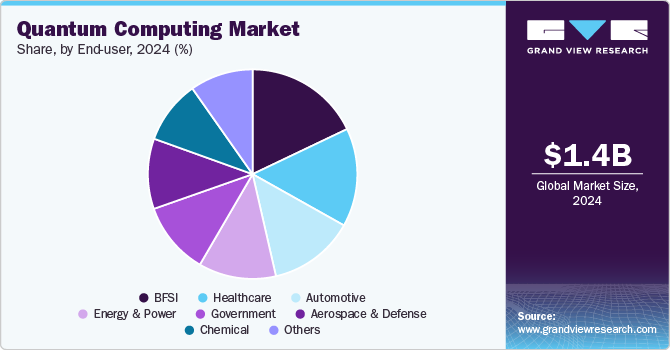Quantum Computing: A Huge Leap In Technology
Quantum computing is not a concept of science fiction anymore. As we are currently in a new era of computational capability, the best brains from every field are trying to utilize the power of quantum mechanics to solve problems that classical computers simply cannot handle. Quantum computing is “poised to unlock a new reality,” with impacts spanning chemistry, energy, AI, autonomous navigation, and cybersecurity. With quantum computing, simulating complex molecules in drug discovery to optimizing global supply chains, the practical potential of it is beginning to be realized at scale.

North America, comprising the United States and Canada, is a leader in this transformative field due to heavy public investments, a strong research and development culture, and increasing enterprise engagement. Globally, the Quantum Computing Market is expected to surpass $4 billion by 2030. Major tech firms such as Amazon, IBM, Google, and Microsoft have already launched commercial quantum-computing services, and startups around the world are racing to build quantum processors and software.
Growth Factors and Applications Driving the Quantum Computing Market
Listed below are the primary growth drivers and applications of quantum computing.
Rising Government Investment
Globally, governments are making huge investments in quantum research and hardware infrastructure. The U.S. National Quantum Initiative and Canada’s National Quantum Strategy are prime examples of investments in accelerating innovation and commercialization. This encouragement has created a favorable ground for startups and research institutions to succeed.
Enterprise Adoption Across Industries
Established players in finance, pharmaceuticals, automotive, and logistics are increasingly exploring the possibilities of quantum computing applications. For instance, JPMorgan Chase is using quantum algorithms to optimize portfolio risks. BMW is using quantum computing power in engine and battery integration for optimizing production processes, such as robot route planning at BMW Group plants.
Quantum-as-a-Service (QaaS) via Cloud Platforms
Quantum computing is becoming more accessible without any huge investments in hardware. This has been possible due to the cloud services offered by platforms such as IBM Quantum, Amazon Braket, and Microsoft Azure Quantum, which allow developers and researchers to experiment with quantum systems remotely. This model lowers the barrier to entry and enables quantum computing access at lower costs.
Cybersecurity Demands and Post-Quantum Encryption
With ongoing advancements in the computing capabilities of quantum computers, they pose a threat to current encryption methods. Hence, many companies have started investing in post-quantum cryptography and quantum key distribution (QKD). These technologies are important for securing future communications against quantum threats, making them a potential growth factor.
Cross-Industry Applications
Quantum computing is impacting a variety of sectors. In healthcare, quantum algorithms can help simulate proteins for drug discovery much faster than current conventional computers. In logistics, companies such as DHL and Volkswagen are experimenting with route optimization using quantum-inspired computing. In energy, quantum simulations are being used to model new materials for batteries and solar panels. These quantum computing applications underscore the technology’s wide-reaching potential.
Gather more insights about the market drivers, restraints, and growth of the Quantum Computing Market
Emerging Trends and Innovations in the Global Market
Advancements in Quantum Hardware
Companies globally are trying to develop more powerful and stable (fault-tolerant) quantum processors. IBM's Eagle (127 qubits) and Google's Sycamore (which achieved quantum supremacy) represent significant leaps in quantum hardware. IBM has also unveiled plans for its 1,000+ qubit chip, Condor, aiming for practical quantum advantage within the next few years.
Hybrid Quantum-Classical Systems
Hybrid systems that blend classical and quantum computing are expected to be among the most popular applications. Companies are developing hybrid solutions that integrate classical computing with quantum algorithms. D-Wave’s Leap Quantum Cloud Service and Rigetti Computing’s platforms are examples of this trend, which offer practical solutions for today’s complex computational problems.
Integration of Quantum Computing with Artificial Intelligence
The integration of quantum computing and AI is opening up new opportunities. Companies like Quantinuum are developing quantum natural language processing tools, strengthening AI's ability to process and understand complex data structures. This integration can yield more efficient and powerful AI applications.
Quantum Software and Ecosystems
A rich ecosystem of software tools and partnerships are being developed to enhance application development. For example, Classiq (an Israeli startup) offers a high-level algorithm-design platform that is already used by BMW, Citi, and Deloitte.
The Road Ahead
Quantum computing is not a futuristic curiosity; it is a rapidly evolving technology that is poised to revolutionize industries. For organizations across sectors, now is the time to understand the technology, assess its applications, and consider partnerships with quantum computing companies. As we approach the tipping point where quantum advantage becomes reality, early adopters will gain significant strategic benefits.
Order a free sample PDF of the Market Intelligence Study, published by Grand View Research.

No comments:
Post a Comment